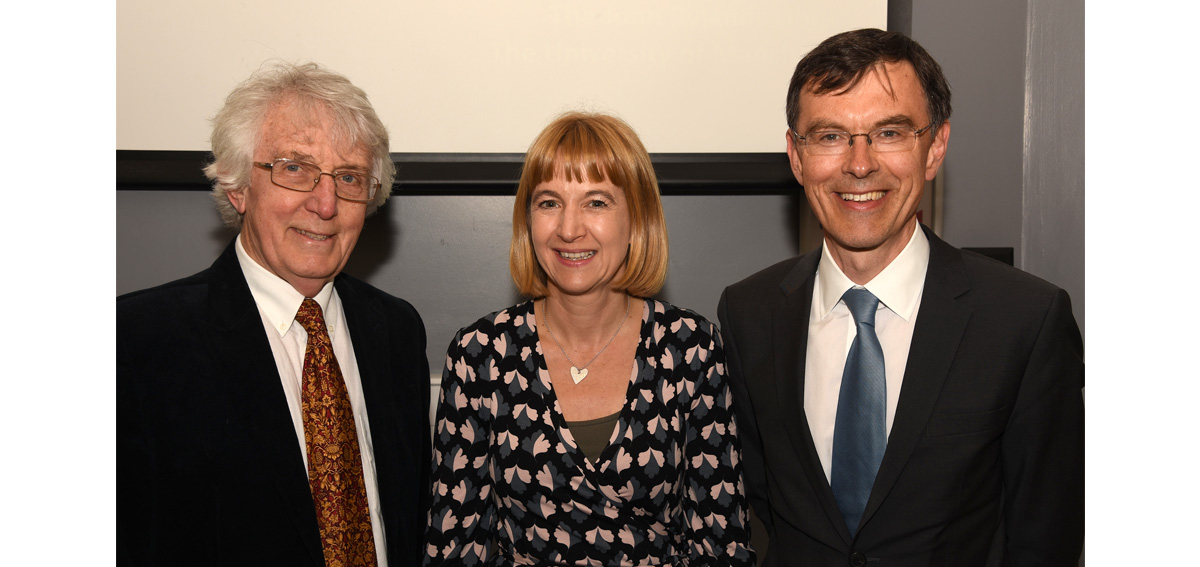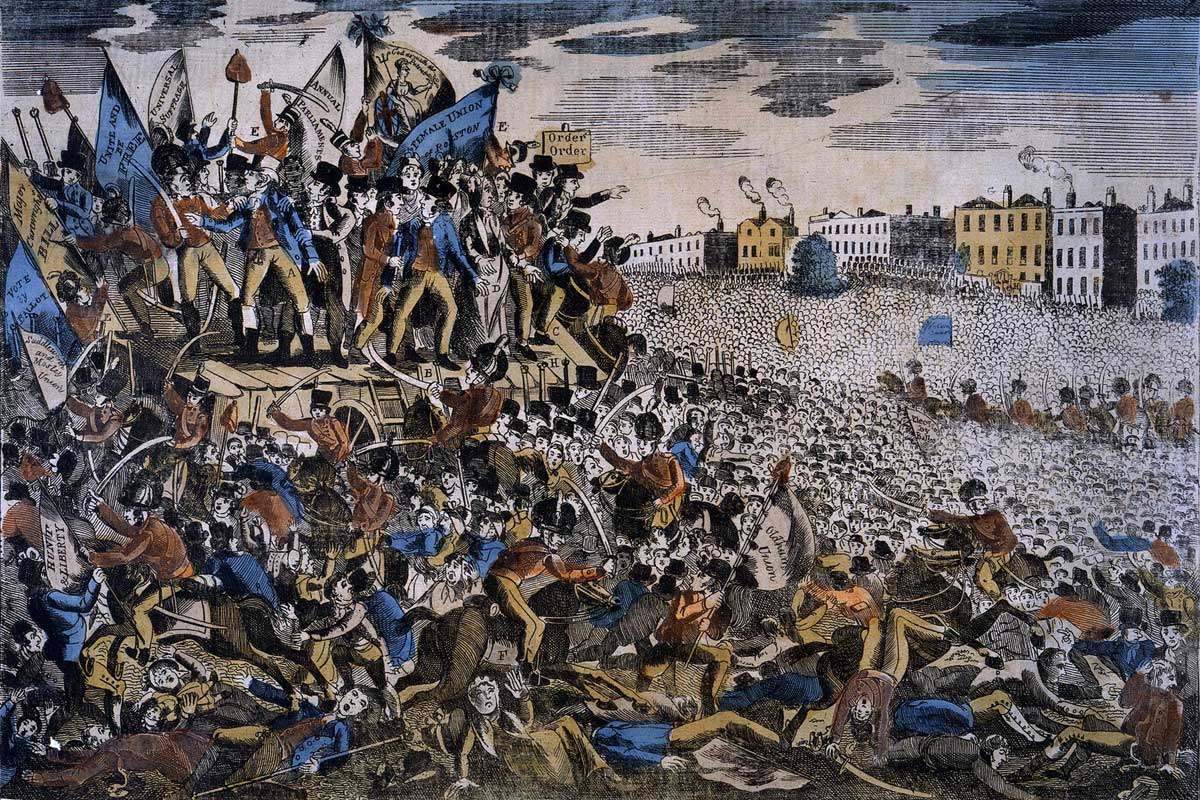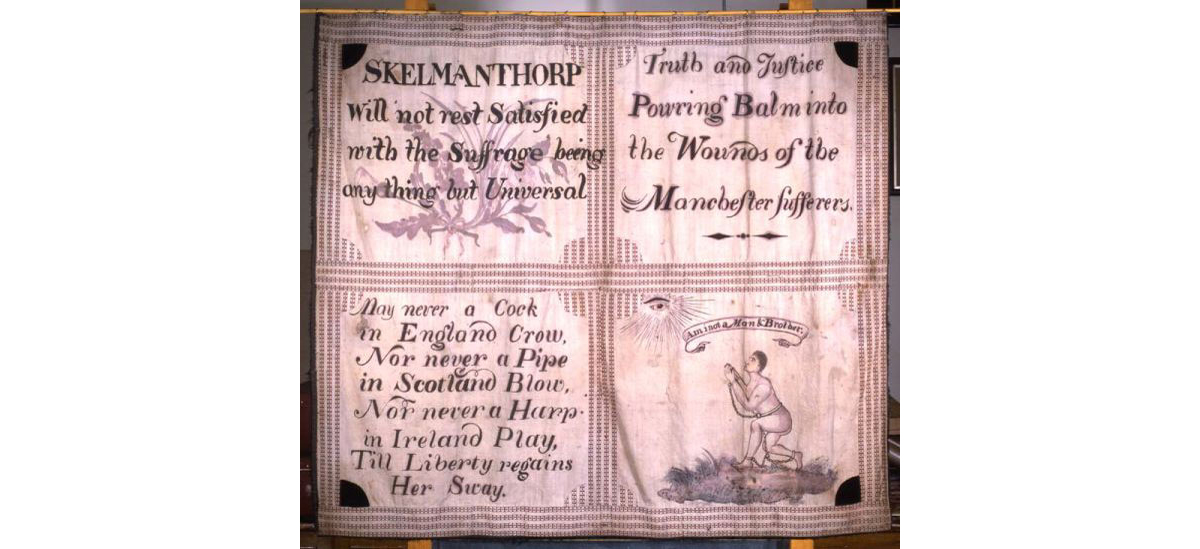Former Huddersfield lecturer Dr Janette Martin gave the 2019 Luddite Memorial Lecture and explained how the legacy of the massacre played out not just in Manchester but across the North of England
 Pictured with guest speaker Dr Janette Martin is Chair of the Huddersfield Local History Society Cyril Pearce (left) and the University’s Deputy Vice-Chancellor and Professor of History Tim Thornton.
Pictured with guest speaker Dr Janette Martin is Chair of the Huddersfield Local History Society Cyril Pearce (left) and the University’s Deputy Vice-Chancellor and Professor of History Tim Thornton.IN August 1819 an ill-trained troupe of sabre-wielding cavalrymen attacked a crowd of 60,000 democracy protesters in St Peter’s Fields, Manchester. They slew almost 20 and wounded hundreds more, perpetrating an atrocity that created contemporary outrage and provided a rallying cry for radicalism over the next 200 years.
In the bi-centenary year of an episode that was almost immediately dubbed Peterloo – an ironic evocation of the Battle of Waterloo, four years earlier – Manchester-based historian Dr Janette Martin has explored its lasting significance and the many ways it has been commemorated, tracking back from the recently-released Mike Leigh film to the placards, ceramics, medals, poems and even clocks that were produced in the aftermath of the event.
She gave her findings at the latest edition of a well-established lecture series at the University of Huddersfield.
Dr Martin is a former lecturer at the University who has a speciality in popular political protest and the role that oratory played in 19th century reform movements. She is now Archivist and Reader Engagement Manager at Manchester’s historic John Rylands Library, where she has curated a Peterloo exhibition that runs until the end of September.
For her, this was a “dream project”, said Dr Martin to a large audience when she delivered the 2019 Luddite Memorial Lecture, organised by the Huddersfield Local History Society and the University of Huddersfield.
“Being a Yorkshire lass I was interested in seeing how Peterloo played out this side of the Pennines,” said Dr Martin, whose illustrated talk showed how reaction to the Manchester massacre was nationwide.
“In the weeks following the massacre, radicals in Huddersfield held meetings in a show of solidarity and some wore black funeral mourning. When Henry Hunt – the principal speaker at Peterloo – was released from prison in 1822, the occasion was marked in Huddersfield with a bonfire, dinner and a procession.”
Dr Martin told how Peterloo played a pivotal role in shaping popular radical culture in Yorkshire and she argued that in this respect it was much more significant than the Luddite risings of 1812.
Peterloo Massacre
 An engraving in the National Archive showing the forcible dispersal of the reform meeting in St Peter’s Field, Manchester, 16 August 1819
An engraving in the National Archive showing the forcible dispersal of the reform meeting in St Peter’s Field, Manchester, 16 August 1819The lecture included an account of Peterloo and the social and political events leading up to it.
“While it’s hard to find anything to justify the behaviour of the magistrates and civil and military powers that day, we have to remember that it was only 30 or so years since the French revolution, and the authorities were scared of large crowds and the potential of mob rule,” said Dr Martin.
Vast cities and concentration of urban working poor in one place was a new phenomenon, she added, and the authorities’ fears were stoked by the appearance of Red Caps of Liberty in the processions filing into St Peter’s Field.
“To the radicals these were symbols of reform but to the authorities nothing less than the insignia of treason.”
Dr Martin’s lecture included a description of contemporary accounts of Peterloo and events such as a massive rally held in Halifax, protesting about the massacre. She told how money was raised to aid victims and she provided illustrations of commemorative jugs, cups, teapots and medals that were sold to reformers. One jug depicts a mounted soldier wielding a sabre as his horse tramples a woman carrying a banner inscribed “liberty or death”.
The lecturer also discussed the radical “Skelmanthorpe banner”, (pictured below) produced in the Huddersfield township and displayed at mass meetings throughout the area, although it frequently had to be hidden from the authorities, being buried in a box in a garden and dug up when required.
 The Skelmanthorpe banner
The Skelmanthorpe banner19th century reform movements
There was an analysis of the elaborately decorated Peterloo Clock, made by W. Stancliffe of Barkisland, near Elland. Illustrated with scenes from the massacre and portraits of leading radicals, it is a luxury item, well beyond the means of a working class household. “It shows that support for reform cut across class lines,” said Dr Martin.
“It’s easy to think of the battle between reformers and loyalists as being divided on simple class grounds – that the protesters assembled at St Peter’s Field were a dispossessed and poverty-stricken mob, whipped to a frenzy by itinerant rabble rousers. This was not the case.
“Many well-heeled and educated people were pro-reform, including wealthy industrialists who were frustrated that large cities such as Manchester had not a single MP and thus had no voice in Parliament,” said Dr Martin, who also described current memorials to Peterloo, which is the main theme of this year’s Manchester Histories Festival.
A key event will be the unveiling of public memorial by the Turner Prize-winning artist Jeremy Deller on 16 August.
“While all anniversaries cast new light on historical episodes, in practice they often reveal just as much about contemporary preoccupations,” said Dr Martin.
“When revisiting Peterloo, it is hard to avoid drawing parallels with today’s political climate. Then, as now, politics has polarised into factions and distinguishing fact from fake news and propaganda is challenging. The bicentenary arrives at a time when the UK is questioning the very nature of democracy and political participation.”
The 2019 Luddite Memorial Lecture was introduced by the Deputy Vice-Chancellor of the University of Huddersfield, Professor Tim Thornton, and Dr Martin was thanked by Cyril Pearce, who chairs Huddersfield Local History Society, soon to reach its 40th anniversary, with membership at record levels, he told the audience.
More news
Third Crusade essay wins international prize
History student James McHale offered his interpretation through his coursework essay and it won him the prestigious Merriman Prize
Rival poets Larkin and Hughes finally together
‘Larkin and Hughes: Poets and Rivals’ is an exhibition on display in the University’s Heritage Quay running to the 21 July
Explores the lives of 17th century ordinary folk
Professor Jessica Malay will scrutinise over 8,000 legal documents for clues about the lives of ordinary 17th century men and women
